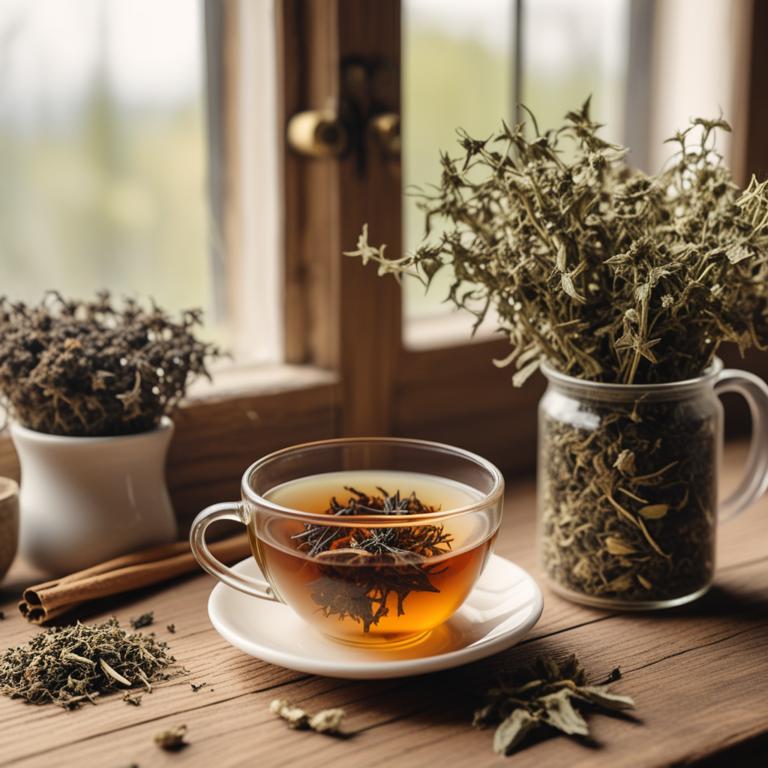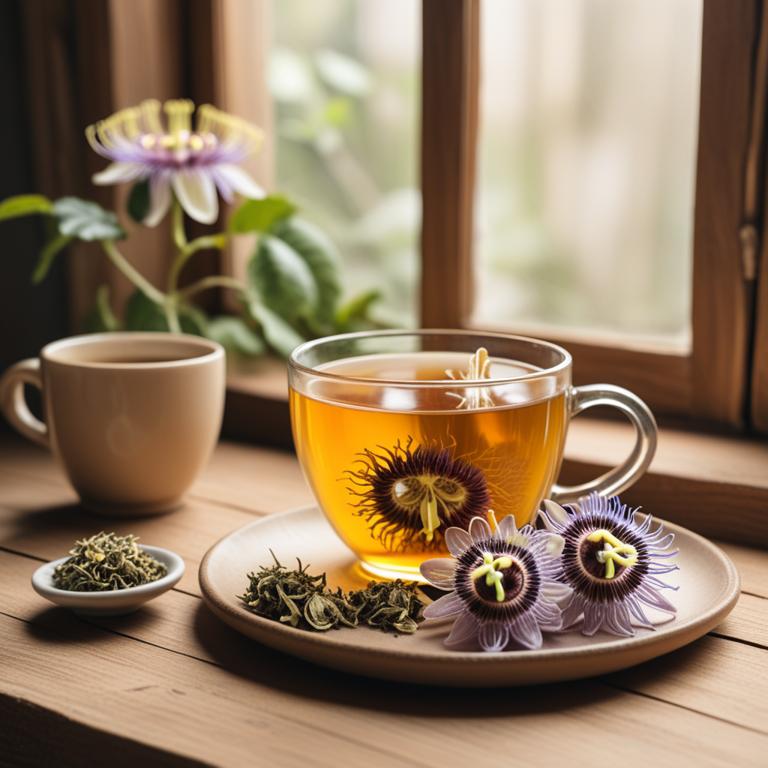10 Herbal Teas For Leg Cramps

Herbal teas can be a great natural remedy for leg cramps.
Leg cramps are often caused by muscle spasms, which can be triggered by various factors such as dehydration, certain medical conditions, or even stress. Herbal teas like Valeriana officinalis, also known as valerian root, can help relax the muscles and reduce the frequency of leg cramps. This is because valerian root contains compounds that have a calming effect on the nervous system, which can help regulate muscle contractions. Another herb that can help with leg cramps is Zingiber officinale, commonly known as ginger. Ginger has anti-inflammatory properties that can help reduce pain and inflammation in the muscles, making it easier to manage leg cramps. Additionally, ginger has natural warming properties that can help increase blood flow to the affected area, which can help speed up the healing process.
Passiflora incarnata, or passionflower, is another herb that can be beneficial for leg cramps. Passionflower has a sedative effect on the nervous system, which can help reduce anxiety and stress, two common triggers for muscle spasms. By reducing anxiety and stress, passionflower can help prevent leg cramps from occurring in the first place. Drinking herbal teas like these can bring several benefits to your life. For one, they can help you manage leg cramps without relying on medication, which can have side effects. They can also promote relaxation and reduce stress, making it easier to fall asleep and improve overall well-being.
By incorporating herbal teas into your daily routine, you can take a proactive approach to managing leg cramps and promoting a healthier lifestyle.
- 1. Valeriana officinalis
- 2. Zingiber officinale
- 3. Passiflora incarnata
- 4. Lavandula angustifolia
- 5. Ginkgo biloba
- 6. Avena sativa
- 7. Foeniculum vulgare
- 8. Glycyrrhiza glabra
- 9. Curcuma longa
- 10. Piper nigrum
1. Valeriana officinalis

Valeriana officinalis teas contains valerenic acid and valeranone, two bioactive constituents that help with leg cramps.
Valerenic acid has a sedative effect, which can relax the muscles and reduce spasms. Valeranone, on the other hand, has anti-inflammatory properties that can reduce swelling and ease pain. Valeriana officinalis teas also contains valepotriates, which are known to reduce the frequency and severity of muscle cramps.
By combining these properties, Valeriana officinalis teas can provide relief from leg cramps by relaxing muscles, reducing inflammation, and easing pain.
- Gather 1 cup of fresh or dried Valeriana officinalis roots.
- Measure 1 tablespoon of Valeriana officinalis roots per 1 cup of boiling water.
- Steep the Valeriana officinalis roots in boiling water for 5-7 minutes.
- Strain the liquid and discard the roots. Let it cool down.
- Drink the tea as needed for leg cramp relief, ideally 1/2 cup at a time.
2. Zingiber officinale

Zingiber officinale teas contains a compound called gingerol, which has anti-inflammatory properties that help reduce muscle spasms and cramps.
Gingerol also has a compound called shogaol, which has a warming effect on the body and helps increase blood flow to the muscles. This increased blood flow and reduced inflammation help relax the muscles and prevent cramps. Additionally, the antioxidants and flavonoids in Zingiber officinale teas help reduce oxidative stress and inflammation in the muscles, further reducing the risk of cramps.
By consuming Zingiber officinale teas, you can help alleviate leg cramps caused by muscle spasms and inflammation.
- Gather 1 cup of water and 1 tablespoon of fresh Zingiber officinale (ginger) root.
- Peel the ginger root and slice it into thin pieces.
- Boil the water in a pot and add the sliced ginger pieces.
- Reduce heat and let it simmer for 5-7 minutes.
- Strain the tea and drink it hot to help relieve leg cramps.
Zingiber Officinale Tea on Amazon
FGO Organic Ginger Tea, 100 Count, Eco-Conscious Tea Bags, Caffeine Free, Packaging May Vary (Pack of 1)
Disclaimer: We earn a commission if you click this link and make a purchase at no additional cost to you.
3. Passiflora incarnata

Passiflora incarnata teas contains a mix of flavonoids, alkaloids, and glycosides that help alleviate leg cramps.
The flavonoids, particularly flavonoids like kaempferol and quercetin, have anti-inflammatory properties that reduce muscle spasms and pain. The alkaloids, including harman and harmine, act as muscle relaxants and antispasmodics, calming muscle contractions and relieving cramp symptoms. The glycosides in Passiflora incarnata teas also contribute to its muscle-relaxing effects by reducing muscle fatigue and spasms.
By balancing the body's response to muscle contractions, Passiflora incarnata teas helps to prevent and treat leg cramps.
- Gather 2 tablespoons of dried Passiflora incarnata root or 4-6 fresh leaves.
- Combine the Passiflora incarnata with 1 cup of boiling water in a saucepan.
- Steep the mixture for 5-7 minutes, then strain it into a cup.
- Add honey or sugar to taste, if desired. Stir well.
- Drink the tea warm or at room temperature, 2-3 times a day as needed for leg cramps.
4. Lavandula angustifolia

Lavandula angustifolia teas contains a number of bioactive constituents, including linalool and linalyl acetate, which are responsible for its muscle-relaxing properties.
These compounds help to reduce muscle spasms and cramps by decreasing the contractions of the muscle fibers and relaxing the smooth muscle. The tea's antispasmodic properties also help to prevent muscle cramps by regulating the nerve impulses that cause them. Additionally, the tea's anti-inflammatory properties may help to reduce swelling and pain associated with muscle cramps.
By reducing muscle spasms and inflammation, Lavandula angustifolia teas can help to alleviate leg cramp symptoms.
- Gather 1 cup of dried Lavandula angustifolia flowers
- Heat 1 cup of water in a pot until boiling
- Add 1 tablespoon of dried Lavandula angustifolia flowers to the boiling water
- Reduce heat and let it steep for 5-7 minutes
- Strain the tea and drink 1/2 cup before bedtime to help prevent leg cramps
5. Ginkgo biloba

Ginkgo biloba teas contains flavonoids and terpenoids as its bioactive constituents.
These compounds help relax blood vessels and improve circulation. The flavonoids in Ginkgo biloba, particularly quercetin and kaempferol, have anti-inflammatory properties that reduce muscle spasms. Terpenoids like ginkgolides and bilobalide also have a relaxing effect on smooth muscles, which can contribute to relieving leg cramps.
The combined action of these compounds helps reduce muscle tension and improve blood flow to the legs, potentially alleviating cramp symptoms.
- Gather 1 cup of water and 1 teaspoon of dried Ginkgo biloba leaves.
- Bring the water to a boil in a kettle or pot.
- Remove the boiling water from heat and add the Ginkgo biloba leaves.
- Let it steep for 5-7 minutes, then strain the leaves.
- Drink the tea while it's still warm, 1-2 cups per day for leg cramp relief.
6. Avena sativa

Avena sativa teas contains the bioactive constituents avenacoside and avenanthramides.
These compounds have anti-inflammatory and muscle-relaxing properties that help reduce muscle spasms and cramps. Avenanthramides also have antioxidant properties that protect the muscles from damage caused by free radicals. The anti-inflammatory properties of avenacoside and avenanthramides help reduce swelling and pain in the muscles, making it easier to manage leg cramps.
By relaxing the muscles and reducing inflammation, Avena sativa teas can help alleviate leg cramp symptoms.
- Measure 1 cup of dried Avena sativa (oats) in a bowl.
- Add 2 cups of boiling water to the bowl. Let it steep for 5-7 minutes.
- Strain the liquid into a cup or teapot using a fine-mesh sieve or cheesecloth.
- Add 1 tablespoon of honey or lemon to taste, if desired.
- Drink 1/2 to 1 cup of the Avena sativa tea to help relieve leg cramps.
7. Foeniculum vulgare

Foeniculum vulgare teas contains a variety of bioactive constituents, including volatile oils and flavonoids.
The main active compound, anethole, has a calming effect on the muscles and helps to relax the smooth muscle tissue in the legs. Foeniculum vulgare also contains other compounds like limonene and pinene, which have anti-inflammatory properties that can help reduce swelling and alleviate pain. The antispasmodic properties of Foeniculum vulgare can also help to regulate muscle contractions and prevent cramps.
Drinking Foeniculum vulgare tea may help to provide relief from leg cramps due to its ability to relax muscles and reduce inflammation.
- Gather 1 cup of fresh Foeniculum vulgare (also known as fennel) fronds and 1 cup of water.
- Wash the fennel fronds in cold water to remove dirt and impurities.
- Add the fennel fronds to a saucepan and pour in the water. Heat the mixture on medium heat for 5-7 minutes.
- Remove the saucepan from heat and let it cool. Strain the liquid to remove the fennel fronds. Discard the solids.
- Drink 1/2 cup of the tea 2-3 times a day to help relieve leg cramps.
8. Glycyrrhiza glabra

Glycyrrhiza glabra teas contains glycyrrhizin, a key active constituent that contributes to its benefits.
Glycyrrhizin has a mineralocorticoid effect, which can help regulate electrolyte balance in the body. This regulation is essential in preventing muscle cramps caused by an imbalance of sodium, potassium, and calcium. Glycyrrhizin also has anti-inflammatory properties that can help reduce muscle spasms and alleviate discomfort.
Additionally, Glycyrrhiza glabra teas has been shown to relax muscle tissues, making it easier for the body to recover from muscle cramps.
- Gather 2 tsp of dried Glycyrrhiza glabra root and 1 cup of boiling water.
- Steep the root in the boiling water for 5-7 minutes.
- Strain the mixture and discard the root.
- Add 1 tsp of honey (optional) to the tea and mix well.
- Drink the tea warm or at room temperature, 1-2 times a day, as needed for leg cramps.
9. Curcuma longa

Curcuma longa teas contains a powerful compound called curcumin, which has potent anti-inflammatory and antioxidant properties.
Curcumin helps relax muscles and reduce muscle spasms by inhibiting the release of certain chemicals that cause muscle contractions. Another key compound in Curcuma longa teas is turmeric, which contains a component called turmerone that helps reduce inflammation and pain. The bioactive constituent demethoxycurcumin also contributes to the analgesic and anti-inflammatory effects of Curcuma longa teas, making it a popular remedy for leg cramps.
Regular consumption of Curcuma longa teas may help reduce the frequency and severity of leg cramps due to its ability to relax muscles and reduce inflammation.
- Gather 1 teaspoon of dried Curcuma longa root and 1 cup of boiling water.
- Steep the Curcuma longa root in the boiling water for 5-7 minutes.
- Strain the mixture into a cup and discard the root.
- Add honey to taste, if desired, and mix well.
- Drink the tea warm or at room temperature as needed to relieve leg cramps.
10. Piper nigrum

Piper nigrum teas contains a compound called piperine, which has anti-inflammatory properties that help reduce swelling and pain in the muscles.
The tea also contains a group of compounds called flavonoids, including kaempferol and quercetin, which have antioxidant properties that help protect cells from damage. Piperine and other compounds in the tea have a warming effect on the body, which can help increase blood flow to the muscles and reduce cramping. The tea's anti-inflammatory and antioxidant properties may also help reduce muscle spasms and soreness, making it a potential remedy for leg cramps.
Regular consumption of piper nigrum tea may also help improve circulation and reduce the frequency and severity of leg cramps.
- Boil 1 cup of water in a kettle.
- Add 1 tablespoon of whole black peppercorns to the boiling water.
- Reduce heat and let it simmer for 5-7 minutes.
- Strain the tea into a cup using a fine-mesh sieve or cheesecloth.
- Drink the tea warm, ideally 2-3 times a day to prevent leg cramps.